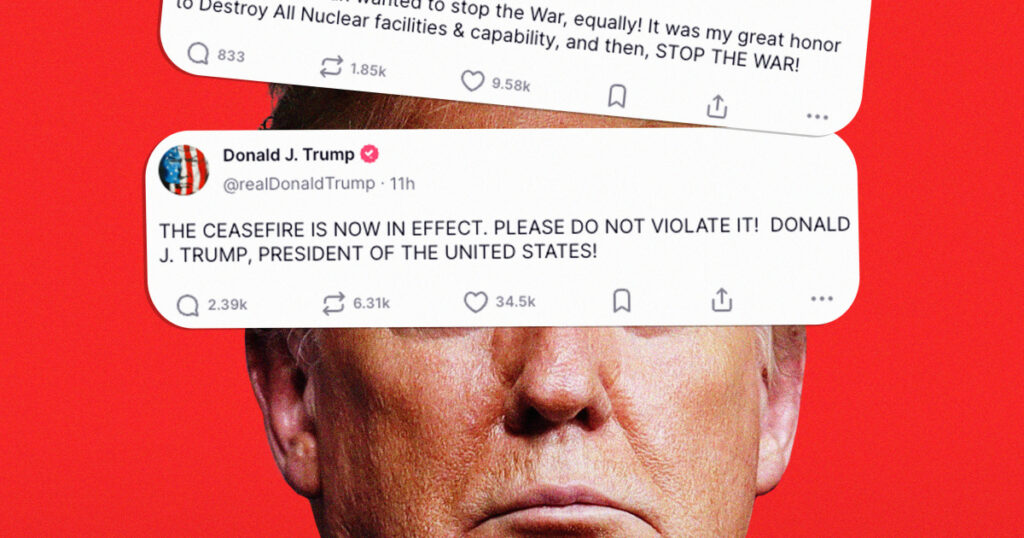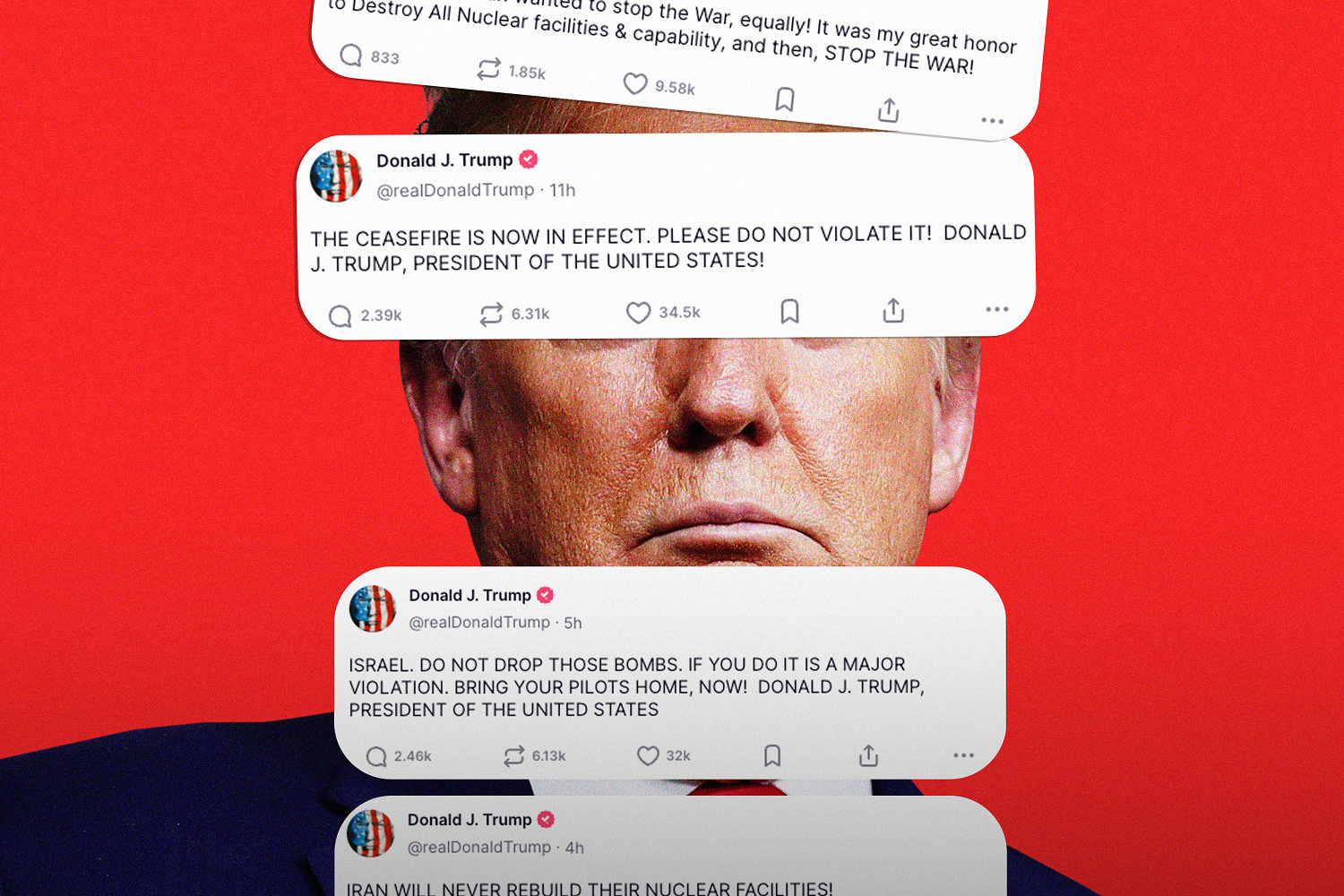

As the conflict between Iran and Israel heated up, and in the wake of surprise U.S. attacks on Iran, President Donald Trump has been carrying out the delicate art of diplomacy through blunt social media posts, full of the bravado — and capital letters — that characterize much of his communications.
“There is not another military in the World that could have done this,” Trump posted to his Truth Social platform on Saturday, announcing the airstrikes on Iran’s nuclear facilities. “NOW IS THE TIME FOR PEACE! Thank you for your attention to this matter.”
“This is an HISTORIC MOMENT FOR THE UNITED STATES OF AMERICA, ISRAEL, AND THE WORLD,” he added in a follow-up. “IRAN MUST NOW AGREE TO END THIS WAR. THANK YOU!”
For many in the U.S. — including some elected officials — Trump’s posts were the primary way to learn about what was happening. Rep. Jim Himes, D-Conn., the ranking member of the House Intelligence Committee, said he first learned about the strikes this way.
Since June 17, Trump has posted to his social media site more than two dozen times on a conflict in which he played a central role. His updates were often punctuated, “Thank you for your attention to this matter!” And, on Wednesday, he even posted footage of a few B2 stealth fighter jets dropping bombs as “Bomb Iran,” a parody of the 1960’s song “Barbara Ann,” played in the background.
Trump has also shared adulatory coverage of his handling of the conflict, frequently linking to commentary on Fox News in recent days and citing political figures like Charlie Kirk and even Jeb Bush, the former Florida governor who ran against Trump for president in 2016.
Trump has for years veered from political convention in using social media to campaign, target rivals or advance his agenda. But in the most consequential foreign policy moment of his presidency, Trump’s diplomacy by social media has garnered renewed attention, remarkable for its break from how past presidents have carried out such interactions.
“Any comment made by the president of the United States about America’s national security is interpreted as our official policy and has impact on the world, regardless of the format in which the comment was made,” Adrienne Watson, who served as National Security Council spokesperson for President Joe Biden, said. “The language of a tweet should be treated with as much care as a diplomatic negotiation. Otherwise, the president has needlessly risked misinterpretation and miscalculation.”
Trump’s allies and advisers have expressed appreciation for the president’s messaging, even in such a high-stakes setting. They said his seemingly off-the-cuff style has helped hammer home his message and make his position clear to all involved. And they added that the very public nature of his social media posts puts additional pressure on both Israel and Iran to go along with what the U.S. wants.
“When you reduce ambiguity in a national security or foreign policy environment, it’s a good thing,” one Trump administration official, who was granted anonymity to speak candidly, said. “The game of telephone through old models of diplomatic channels, you can still use them. But when appropriate, the commander in chief voicing his goals, his ideas, so forcefully and so clearly, is a good thing.”
Kenneth Weinstein, the Japan chair of the Hudson Institute, a conservative think tank, said Trump’s social media strategy is about his need “to eliminate the middleman.”
“He does not trust the bureaucracy to take his messages and transmit them, and he can transmit them very bluntly and very directly and in real time, rather than having to go up and down the chain,” Weinstein said. “And that’s what he sees: The reactions can be immediate to it, rather than setting up a meeting, and somebody has to get on an airplane.”
Weinstein said he sees Trump’s method as effective because other countries know these posts reflect his real thinking.
“Whether it’s deceiving the Iranians, whether it’s bluntly delivering a message to either our allies or partners or our adversaries, they get the message and they understand it’s coming from him,” he added. “And they don’t have to scratch their heads and wonder.”
But there are risks in Trump’s approach, too, particularly as he speaks on nuanced diplomatic matters in absolute terms — whether it be about “totally destroyed” nuclear sites or a “forever” ceasefire, results he may be trying to manifest at an early stage.
Those risks were magnified Monday, when Trump was the first to announce a ceasefire agreement on Truth Social.
“It has been fully agreed by and between Israel and Iran that there will be a Complete and Total CEASEFIRE (in approximately 6 hours from now, when Israel and Iran have wound down and completed their in progress, final missions!), for 12 hours, at which point the War will be considered, ENDED!” Trump wrote.
That post kicked off hours of confusion, as both Israel and Iran seemed reluctant to confirm that there was an agreement and that they would abide by it. Trump posted through it. At crucial moments when it seemed the ceasefire hung in the balance, he weighed in multiple times to exhort both sides, but especially Israel, not to do anything to set the other off.
Trump also engages in more traditional diplomatic methods, like calling Israeli Prime Minister Benjamin Netanyahu on Tuesday and urging him to turn around Israeli planes set to target Iran.
“President Trump was exceptionally firm and direct with Prime Minister Netanyahu about what needed to happen to sustain the ceasefire,” a White House official told NBC News. “The Prime Minister understood the severity of the situation and the concerns President Trump expressed.”
Later Tuesday afternoon, an initial assessment by the Defense Intelligence Agency concluded that the U.S. airstrikes on Iranian nuclear enrichment sites did not destroy the facilities, but rather set the country’s nuclear program back by only a few months, according to three people with knowledge of the report.
That assessment ran counter to Trump’s Truth Social posts, which talked up the “obliteration” of three Iranian nuclear facilities the U.S. bombed over the weekend and the “monumental damage” they sustained. White House press secretary Karoline Leavitt disputed the DIA report as “flat-out wrong,” adding, “The leaking of this alleged assessment is a clear attempt to demean President Trump, and discredit the brave fighter pilots who conducted a perfectly executed mission to obliterate Iran’s nuclear program.”
Trump’s message has at times appeared to conflict with other administration officials, like on Sunday when, after Vice President JD Vance told NBC News’ “Meet the Press” the administration’s “view has been very clear that we don’t want a regime change” in Iran, Trump posted to Truth Social: “It’s not politically correct to use the term, ‘Regime Change,’ but if the current Iranian Regime is unable to MAKE IRAN GREAT AGAIN, why wouldn’t there be a Regime change???”
“MIGA!!!” he added.
Trump later said he does not want regime change in Iran.
Elliott Abrams, a deputy national security adviser under President George W. Bush and a special representative for Iran and Venezuela in Trump’s first term, said that while there are upsides to the president’s social media diplomacy — particularly the speed with which he is able to spread messages and the certainty readers have that they’re getting Trump’s own views — the filters that are being pushed aside “can serve a really useful purpose.”
“There isn’t anybody who knows everything and can’t make mistakes,” Abrams, now a senior fellow in Middle Eastern studies at the Council on Foreign Relations, said. “And that includes presidents, which is why they’re supposed to have and use a good staff.”
“The statement about ‘obliterating’ their nuclear weapons program … when he made that statement we clearly had no information,” Abrams added. “So the danger you run into there is your remarks are discounted and everyone says well, ‘He probably doesn’t mean that.’ So you’re undermining your own impact.”
Reached for comment on Trump’s social media strategy amid the conflict, White House spokesperson Anna Kelly said: “The President has proven that our Commander in Chief can remain accessible while maintaining operational security for important missions, as proven by the tremendous success and flawless execution of Operation Midnight Hammer.”
Trump’s handling of communications around a foreign conflict is far different than that of his predecessors — though being able to message quickly under these conditions is critical under any process, said Rufus Gifford, who served as Biden’s chief of protocol and ambassador to Denmark under President Barack Obama.
“You want to control the narrative,” Gifford said. “So you have to release a statement quickly in order to make sure that people understand what just happened. Because obviously, if you drop a bomb, people are going to learn pretty quickly that that just happened. So you have to take responsibility for it.”
But Gifford said that the tone leaders take in talking about the degree of success of such an operation should be similar to how they communicate during any sort of national disaster, whether it be a mass shooting or a hurricane.
“You own it, and you show that leadership,” he said. “And then in the days and weeks to come, we’ll figure out and we will provide more, but it’s more important than anything else that you have that what you’re reporting to the American people is 100% true, and the world is 100% true, at least to the best of your knowledge. And I think that that doesn’t happen in this instance, and I think that’s damaging.”
“When the United States speaks, it’s very often the last word,” Gifford added. “It’s hard when diplomacy is contingent on the informality and … a degree of bad grammar and all-caps and all that ridiculousness. I understand that’s a style that [others] support. But generally speaking, I find it to be largely counterproductive. And potentially even risky considering the situation.”
Trump’s posts also show a leader who is eager to put his own stamp on the conflict and cement his role in history alongside it. At times, he has presented himself as the only person who could stop a conflict, writing Monday evening that “Israel & Iran came to me, almost simultaneously, and said, ‘PEACE!’”
“I knew the time was NOW,” he wrote.
On Tuesday, referring to the Arab-Israeli War of 1967, which Israelis refer to as the Six-Day War, Trump dubbed the recent conflict between Israel and Iran the “12 DAY WAR.”
“Both Israel and Iran wanted to stop the War, equally!” Trump wrote Tuesday. “It was my great honor to Destroy All Nuclear facilities & capability, and then, STOP THE WAR!”
A close Trump ally, speaking on condition of anonymity, said the president “knows this is a historical event, and he wants to establish exactly what he wants the history books to be, and he doesn’t trust anyone else to do that.”
“You’ve got three people who all want to have history written slightly different,” this person added, referring to Trump, Netanyahu and Iranian Supreme Leader Ayatollah Ali Khamenei. “He’s trying to establish himself as the most dominant figure of the story.”
The president’s social media habits highlight what a second Trump administration aide said is his broader approach to governance.
“Trump doesn’t think he needs to be staffed, really,” this person said, adding that Trump isn’t one to require that national security decisions to go through multiple levels of policy coordination committees and then an international security cabinet meeting. “It’s just not bottom up. He’s in the room with his advisers, and he makes decisions, and then he tells the whole world.”
As for the impact of Trump’s diplomacy-via-Truth Social posts, this person said all of the actors in the region are still trying to sort out their own positions.
“The best way to describe it is, there’s probably a lot of confusion from everybody, friend and foe alike, which I think is how he likes to operate,” this person said. “That’s an uncomfortable position for most people. It’s not an uncomfortable position for the president. He likes strategic ambiguity because he thinks it gives some flexibility on decision making.”
 Latest World Breaking News Online News Portal
Latest World Breaking News Online News Portal






